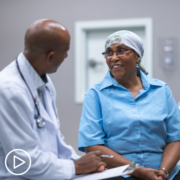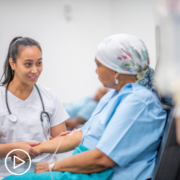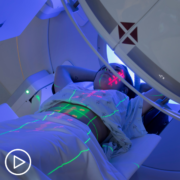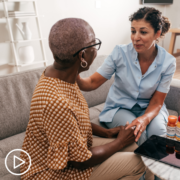Navigating Advanced Endometrial Cancer: Treatment, Prognosis, and Lifestyle Strategies
Navigating Advanced Endometrial Cancer: Treatment, Prognosis, and Lifestyle Strategies from Patient Empowerment Network on Vimeo.
How does the treatment of advanced endometrial cancer prognosis differ from other gynecological cancers? Expert Dr. Charlotte Gamble from MedStar Health shares common challenges that she’s seen with her patients and patient advice to help optimize their care.
[ACT]IVATION TIP
“…I always encourage patients, and when I meet with them for the first time, I ask them, who is your main support person? And if they’re not here right now, let’s actually get them on the phone. They need to be involved from the start to understand this hurdle that you’re going to be going through over the next several months.”
Download Guide | Descargar Guía en Español
See More from [ACT]IVATED Endometrial Cancer
Related Resources:
Transcript:
Lisa Hatfield:
Dr. Gamble, how does advanced endometrial cancer differ from other gynecological cancers in terms of treatment of prognosis, and what lifestyle changes can help improve outcomes for patients with advanced endometrial cancer?
This is such a heavy question, so necessary. I think that, classically what we’re taught is that endometrial cancer is very curable, very treatable.
All you need is a hysterectomy and surgery, and then you’ll be done. But what we see, and specifically in my work, and I take care of mostly Black or African American patients, is that, there are certain types of cancers specifically that are a little bit more prevalent in the, African American community within endometrial cancers that are more aggressive, that need not only surgery, but need chemotherapy and might, because they’re more aggressive, patients come and are already at like stage III or sometimes stage IV, when they’re actually being diagnosed, not due to any sort of delay and recognizing their symptoms or delay in diagnosis, but literally when their symptoms occurred, they were already stage IV. And this is a really, really, really challenging space to be in.
And historically also very challenging because again, as I mentioned, endometrial cancer is one of the least, if not the least funded cancers of the National Cancer Institute in terms of clinical trials. And so there have not been, historically a lot of options for patients who have advanced stage endometrial cancer, aside from our classic chemotherapy drugs with carboplatin (Paraplatin) and paclitaxel (Abraxane) take six cycles. You see how things go and maybe these patients get radiation. And so it’s been a very challenging space to be in over the past couple of years.
As I mentioned, these new immunotherapy drugs are really, giving us a lot of hope and very exciting space, now to see how these novel immunotherapy drugs help to maybe change some of those prognostic factors for patients. But it’s a tougher diagnosis. The survival is not as good as someone who has early stage non-aggressive endometrial cancer.
And so, not only do patients get their surgery, but they’re also getting the chemotherapy. And now, oftentimes getting immunotherapy onto this, and immunotherapy continues after the chemotherapy for oftentimes up to three years. And so patients are on treatment for a lot longer. I think that, you know, in terms of lifestyle changes, again, there’s not a lot of research in this area.
Traditionally, we think of, endometrial cancer as a cancer that is, that can occur more frequently in patients who are overweight, or have elevated BMIs. And so, their cardiovascular health is actually very important. And so lifestyle changes to address their cardiovascular health is going to be much more beneficial than anything else, that occurs. But what I unfortunately see in my practice is that you, might, your heart might be just fine, but if you’ve got cancer that’s in your lungs or in your upper abdomen or in your bones, when you’re diagnosed, that kind of takes over everything, and it’s very difficult to treat.
I think what is important when I personally think about lifestyle factors and, advanced stage of endometrial cancer, is trying to maintain a healthy enough lifestyle and adequate strength to get through the necessary treatments, that are really tough with chemotherapy and immunotherapy. And so the healthier a patient is when they’re diagnosed, the stronger they are through their treatments, the better able that they’re able to maintain their nutrition and as, moderate amount of exercise during their treatments, the better they are able to get through their treatments in a timely fashion.
And a lot of this can be also tied to the amount of support that patients have in their lives. If someone is isolated and has very little, family or friends that are able to be there for them, it’s a much harder mental barrier to get through all of this aggressive treatment than someone who might, have patient or patient advocates with them or friends or family members that are always around.
So I always encourage patients, and when I meet with them for the first time, I ask them, who is your main support person? And if they’re not here right now, let’s actually get them on the phone. They need to be involved from the start to understand this hurdle that you’re going to be going through over the next several months.
So I always tell folks that, you know, I’ll take care of all the medical stuff, I’ll do the surgery, and I’ll run the chemotherapy, and me and my nurse navigator will be able to handle all the medical things. And so you don’t need to worry about that. But the psychological burden this takes, the mental and emotional burden this takes is going to be something that is really going to be much more in the patient’s control and much more in your control as you get through this.
And so finding your support structures and making them, making sure they’re involved from the very start is very, very critical. One of the trials that we have open here, at my health system is looking at the role for increasing social support for patients who are Black, who have advanced stage endometrial cancer and seeing what forms of social support, if that’s group therapy or if that’s one-to-one, peer survivor support or just additional information, if that actually can, which one of those might be the best and help patients get through their therapies. And that’s a trial that’s run by Dr. Doll out of University of Washington.
Advanced endometrial cancer is a tough diagnosis to have, and the survival outcomes, although changing rapidly with the introduction of immunotherapy drugs, are, still a challenge. The lifestyle changes, it really comes to, you know, what patients can do to get through their treatment in a timely fashion. But I think the role of social support and having people that can carry patients through and get them through this tough time is central to this question.
Share Your Feedback:
Create your own user feedback survey






















